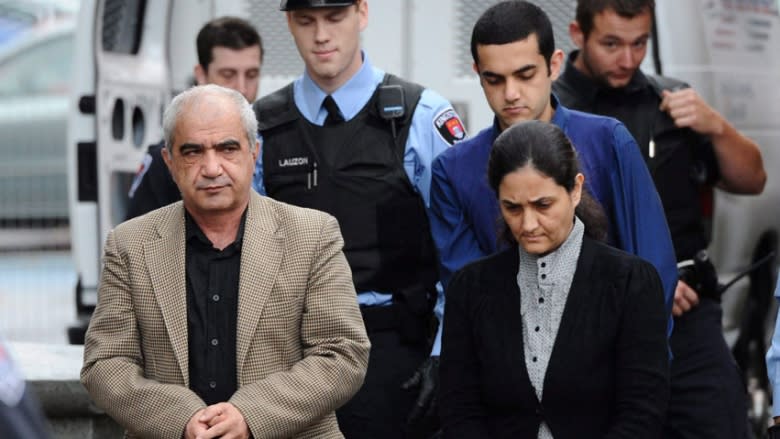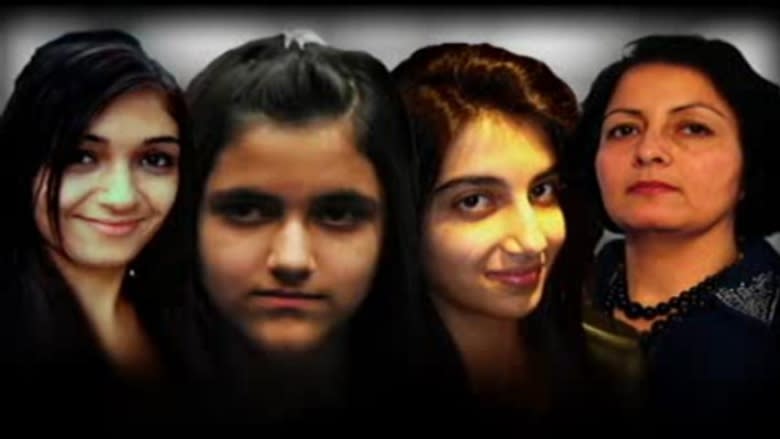Mohammad Shafia intimidated prisoners into attending prayers
The Montreal man serving a life sentence for killing his wife and three teenage daughters intimidated other prisoners to the point that one asked to be put in isolation, a Senate committee has heard.
Psychologist Robert Groves, who worked in Kingston Penitentiary, testified Monday before the national security and defence committee hearing on security threats facing Canada. He said he met with one particular non-Muslim inmate who went to great lengths to avoid Shafia.
"It turned out that he felt so intimidated by Shafia and some of his lieutenants, that he chose to give up his relative freedom of movement on the range in the general population for a much more restricted life on a social isolation range," Groves said.
"He could no longer come to see me. I had to go to his cell on the isolation range. He advised me that confinement was worth it to avoid the hassle of dealing with 'the Muslims'"
After his first-degree murder conviction in 2012, Shafia took on a religious leadership role at the Kingston Penitentiary — the onetime maximum-security prison — organizing Friday prayers when the sole Imam permitted to minister to inmates in Canada was not available, according to Groves.
"This man was obnoxious in manner, demanding of the Protestant and Catholic chaplains, and generally offensive," he said.
"The normally pleasant atmosphere associated with the Muslims gathering for prayers was absent. Inmates on the same range as Shafia who came to see me expressed fear of him."
Groves said he was surprised to find Shafia leading the religious gathering Friday given that he had shown little remorse for the 2009 killings.
Shafia's three teenage daughters and his first wife in the polygamous marriage were found in a car submerged in the Kingston locks after a family road trip to Niagara Falls.
Shafia, his second wife, Tooba Mohammad Yahya and their son, Hamed Shafia, were convicted of the murders, which the prosecution argued were planned and deliberate, motivated by Shafia's displeasure with his daughters betraying traditional Afghan values.
The three each received an automatic life sentence with no possibility of parole for 25 years.
'Self-appointed' prayer leader
Groves said he believes Shafia was "self-appointed" in his role in the prison, and said about 25 men gathered for prayers.
"They were not [all] Muslims but believed that they dare not refuse to attend Friday prayers," he told the hearing.
"This form of intimidation is what one finds routinely with zealot extremists."
Groves's testimony focused on the potential for radicalization of the prison population.
The Correctional Service of Canada has said there is little hard evidence to show radicalization is occurring inside Canadian institutions, but said the service has protocols to flag and manage "at-risk" offenders.
However, some experts believe the corrections system isn't doing enough to confront the risk of Canadian prisons becoming a hotbed for conversion to extremist views.
Groves said he believes the problem posed in institutions by radicalization may not "manifest in the expected ways."
He said he believes more protection should be offered to inmates in the general prison population who are at risk of being intimidated into religious zealotry.
Kingston Penitentiary closed down in the fall of 2013 and the inmates were moved to other federal institutions across the country.
The Correctional Service Canada will not disclose where Shafia is now serving his sentence, citing the Privacy Act.



